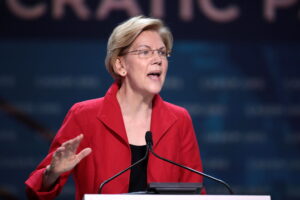by Andrea Traietti on January 16, 2020
Opinion

by Alyssa Cohen ’21
Opinion Staff
The recent concern of war with Iran amidst the height of the 2020 presidential campaign has brought the topic of military spending in the political limelight.
The question remains whether the enormous sums of money the United States government channels into the Pentagon are legitimate.
According to defensenews.com, the Senate recently approved President Trump’s request to increase the defense budget, now allotting $738 billion dollars for military spending in the year 2020.
Several progressive candidates in the 2020 race have proposed campaign platforms that would involve implementing more stringent laws surrounding military spending as well as significant cuts to the Pentagon’s ever-expanding budget.
Despite the superficial logic of implementing such reforms in military spending, the looming prospect of a war with Iran may encourage voters to veer away from casting their ballots for candidates who propose such progressive platforms.
As military spending and military power oftentimes become conflated, voters could mistakenly snub a candidate who supports reforming rather than increasing the Pentagon’s budget as they may perceive such policy as a threat to U.S. safety, especially in light of current tensions between Iran and the United States.
In actuality, reforming the way the United States currently invests in the Pentagon would allow federal funds to be better maximized, given that such change would inhibit the enduring influence of corporate corruption upon the Pentagon by closing the revolving door between employees of the Department of Defense and corporate contractors.
According to POGO.org, in 2016 the “top 20 defense contractors had hired at least 645 senior government officials, military officers, Members of Congress, and senior legislative staff” and “nearly 90 percent of those former federal employees now work as lobbyists, while the operational skill is influence peddling.”
Not to mention the United States Secretary of Defense from 2017 to 2019, Patrick M. Shanahan, was a former top executive for Boeing.
According to elizabethwarren.com, contractors of large corporations such as Boeing and Raytheon have “deployed an extremely profitable strategy” in hiring retired government officials affiliated with the Department of Defense as lobbyists.
Essentially, corporate executives utilize former government employees “to use their relationships and access to influence our country’s national security apparatus for one purpose— to secure lucrative contracts and boost profits.”
Consequently, the extent of this corrupt corporate influence upon the Pentagon may be directly reflected in the findings of a recent audit of the establishment. According to nation.com the Pentagon failed its 2018 audit report revealing over 21 trillion dollars of funds unaccounted for between the years of 1998 and 2015.
The past mismanagement of federal spending at the Pentagon proves especially disheartening considering that, corruption aside, the United States boasts the largest global military budget—greater than that of the ten military powers behind us combined.
According to POGO.org, the U.S. spends more on the Pentagon budget than on “education, medical research, border security, housing, the FBI, disaster relief, the State Department, foreign aid—everything else in the discretionary budget put together.”
While it remains critical to the safety of the nation to maintain and invest in the military, the excessive funds the U.S. continually funnels into the Pentagon fail to improve the overall safety of the country. Corporate corruption within the government has enabled the mismanagement of taxpayer dollars that should rather be invested in education and healthcare rather than channeled into the pockets of corporate executives.
According to buisnessinsider.com, while America proves one of the wealthiest nations in the history of the world, equipped with one of the strongest military powers, our nation has fallen to number 27 in the world in terms of healthcare and education. Concurrently, approximately 13.9 percent of our population falls below the poverty line as healthcare expenses perpetually serve as the leading cause of bankruptcy in the nation.
To that end, in order to better implement federal funds, progressive candidates in the 2020 presidential race have offered policy proposal campaigns to reform military spending.
Such policies include the implementation of legislature that would terminate the influence of the revolving door between corporate contractors and the Pentagon, and the redistribution of military funding to ensure taxpayer dollars are most effectively utilized. Essentially, despite the timeliness of the threat of war with Iran in conversation with the upcoming Democratic primaries and 2020 presidential election, Providence College students should consider voting for candidates who prioritize the reform, regulation, and redistribution of military funding.
As college students constitute a large number of voters in the United States, we can have a substantial impact on the outcome of the presidential election. Consequently, the influence of college voters could incite instrumental reform in terms of improving the budgeting and oversight of federal capitol.
In turn, PC students have the power to elect progressive candidates that could improve the safety and overall welfare of the public and enable the military budget to be maximized and reallocated to establish a more equitable American society.